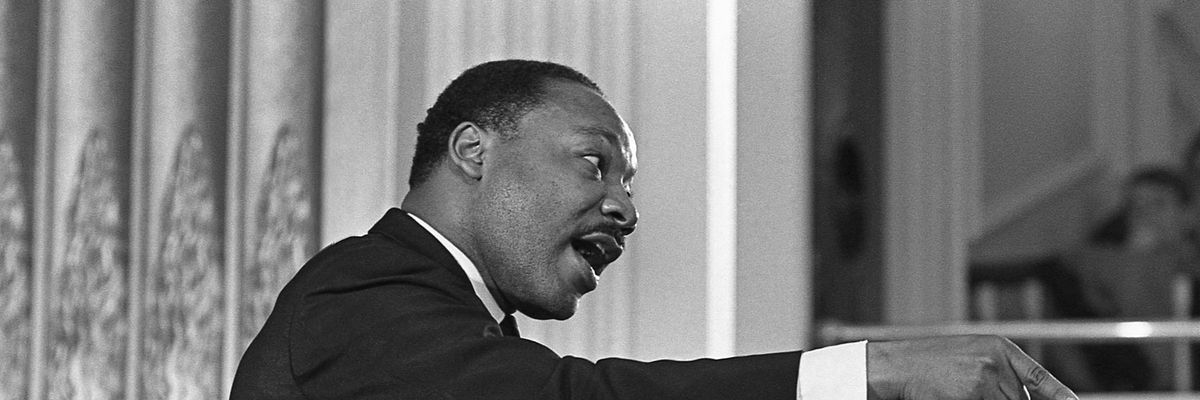Today's anniversary of the birth of Dr. Martin Luther King Jr. calls for more than playing back a few lines from his "I Have a Dream" speech or showing a few pictures of the 1963 march on Washington, as historic as those were. It calls for a deeper reflection on his life, work, and teachings. One good place to start that reflection is with his April 4, 1967 speech against the Vietnam War, delivered at New York's Riverside Church a year to the day before he was assassinated.
If Dr. King were alive today, he would despair at the state of our foreign and domestic policies.
King began his speech by attempting to preempt the arguments of critics who claimed that he had no business wading into the debate over the war, asserting, in King's words, that "peace and civil rights don't mix." The criticisms came anyway. As historian David Garrow noted in a New York Times op-ed published on the 50th anniversary of the speech, it "drew widespread condemnation across the political spectrum," including in the Times. Criticisms aside, King was right then, and many of his arguments are sadly still relevant today.
King's first point in drawing the connection between ending racism at home and curbing militarism abroad had to do with the waste of precious resources:
"I knew that America would never invest the necessary funds or energies in rehabilitation of its poor so long as adventures like Vietnam continued to draw men and skills and money like some demonic destructive suction tube."
Note that King said, "adventures like Vietnam," underscoring his fear that the Vietnam War would not be the last example of a devastating and counterproductive U.S. military intervention.
He saw the temptation to intervene as being grounded in systemic flaws in the American system, which he described as the "giant triplets of racism, extreme materialism, and militarism." He stated that beyond Vietnam, "we will be marching for these and a dozen other names [of potential war zones] and attending rallies without end, unless there is a significant and profound change in American life and policy."
In short, until America attends to its problems at home, from pandemics to racial and economic injustice to the fires, floods and storms that are ravaging our country, it will be difficult if not impossible to pursue a less militarized foreign policy. And likewise, continuing to prosecute multiple wars abroad will undermine our capacity to solve our problems here. In our own time King's call has been taken up by the Poor People's Campaign, a social justice initiative co-chaired by Rev. William Barber and Rev. Liz Theoharis, which has added protecting us from environmental degradation and climate change to the list of priorities that must be addressed with what King described in his speech as "the fierce urgency of now."
Fifty-five years after King's Riverside Church speech, the obvious question is where we stand in combatting the problems he so eloquently and scathingly described. The short answer is that we have made far too little progress, to put it mildly. While President Biden deserves credit for ending America's 20-year war in Afghanistan, the Costs of War Project at Brown University estimates that the United States is militarily still engaged in 85 countries, enabling or prosecuting wars in Iraq, Syria, Somalia, Yemen and beyond; maintaining over 750 overseas military bases; and spending far more for military purposes than at the height of the Vietnam or Korean Wars.
Meanwhile, the Pentagon is spinning out scenarios for a war with China at a time when Washington needs to be cooperating with Beijing on pressing problems like climate change, preventing future pandemics, and controlling and reducing nuclear arsenals. This can be done without excusing China's repression of its Uyghur population, its crackdown on democracy in Hong Kong, or its military maneuvering in the South China Sea. But none of these problems will be solved by building more aircraft carriers or spending up to $2 trillion on a new generation of nuclear weapons. An arms race with China, much less a war between two nuclear-armed powers, could spur an unprecedented catastrophe that can and must be prevented.
If Dr. King were alive today, he would despair at the state of our foreign and domestic policies, but he would also hold out hope that people of goodwill can organize against and overcome the enduring obstacles to achieving peace, public health, and social, and economic justice. The time to act is now.

